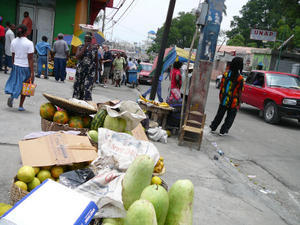Advertisement

 Haiti
Haiti
90 percent of the Haitian population are jobless, so street stalls like this one can be found everywhere as people try to make money buying and selling goods. Haiti - what a place! We arrived mid-afternoon and received warm greetings from the Divisional Commander, Major Lucien Lamartiniere. Straight away, we found the country fascinating - there are UN troops everywhere, driving around in their utes with mounted sub-machine guns! There hasn’t been a coup here for two years, but if you ask anyone around here they’ll tell you that it’s not a matter of IF there will be another one, but WHEN. Apparently this country has had 100 presidents in the past 200 years… that’s a lot of conflict. And you can see the effect that it’s had on the people. Haiti is a very, very, very, very poor country. They say the unemployment rate here is 90 percent. People survive by buying and selling goods at little street stalls. Others rely on money that relatives who live in America or Canada send back. But for all of these problems, looking at the people you wouldn't know it. They are so friendly and easy going - very willing to help and even though we don't know a bit of their language they are keen to have a chat anyway (sign language does wonders!)
As we were driving

 Major Lamartiniere
Major Lamartiniere
Richard and Luke filming the Haitian Divisional Commander, Major Lucien Lamartiniere.to The Salvation Army’s compound in Port-au-Prince, Haiti’s capital city, Major Lucien was telling us what a poor and dangerous area it is. He said that just last year there was some fighting and no cars could drive into or out of the area because it was just too dangerous. The only vehicles the rascals would let through were Salvation Army cars - that’s how much respect the Army has here.
Driving through the area I noticed that there was all these water spouts running and people everywhere filling up their buckets. Major Lucien explained that the water gets turned on twice a week, so people have to get all that they need on those days and make do for the rest of the time. Electricity is usually on for about 6-8 hours a day, but sometimes 6 weeks can go by without electricity. Many companies and organisations like The Salvation Army have generators and solar power, but ordinary people don’t have those luxuries.
It was an amazing streetscape looking out the window as we drove along. There are rubbish piles everywhere and culverts full of rubbish and dirty water. Unfinished buildings and piles of rubble make the place look like a bit of a war-zone and the political graffiti scrawled on many of the buildings is a reminder of the constant tension Haitians live in.
We’re staying in a guesthouse in a compound next to DHQ. Inside the compound is a school, an orphanage, a clinic and malnutrition feeding centre and Port-au-Prince’s only corps. It’s a hive of activity with friendly kids running around everywhere wanting to talk to you and shake your hand! If only we knew Creole, the local French language…
Advertisement
Tot: 0.161s; Tpl: 0.01s; cc: 9; qc: 48; dbt: 0.0505s; 1; m:domysql w:travelblog (10.17.0.13); sld: 1;
; mem: 1.1mb

 Haiti
Haiti
 Major Lamartiniere
Major Lamartiniere
Gerardo Gochez
non-member comment
so close now
I am next door to you in Dominican Republic, glad to kow you are so close. We are working on the aftermath of heavy rains that destroyed many homes including some of soldiers and children sponsored by the army. My prayer are with you as you travel.